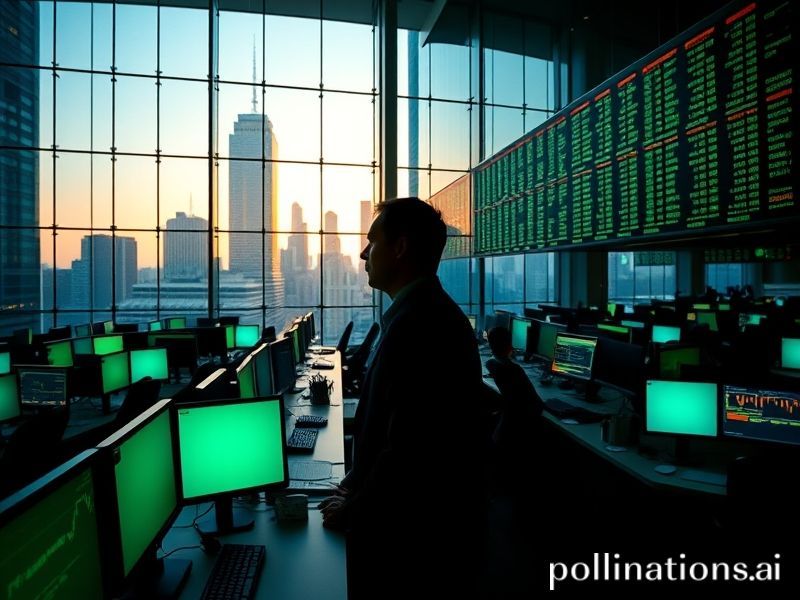Bloomberg: The Global Terminal That Sells Panic by the Pixel
Bloomberg: The Terminal That Runs the World—Or at Least Thinks It Does
By the time the sun has crept over the Sea of Marmara, a trader in Istanbul is already jabbing at a keyboard the color of old money, watching yields on 10-year Treasuries twitch like a cat in a thunderstorm. Half a world away, an energy analyst in São Paulo is pricing cargoes of LNG with the same keyboard, same keystrokes, same Bloomberg terminal. The machine itself is a beige monument to late-’80s ergonomics, but the software—ah, the software—has become the lingua franca of global capitalism, a kind of Esperanto spoken exclusively by people who would sell their own grandmothers for a 2-basis-point edge.
In theory, Bloomberg LP is merely a media and tech company founded by the former mayor of New York who once banned large sodas for public health and then installed a fleet of SUVs to ferry himself around town. In practice, it is the planet’s most successful marriage between information and anxiety: a $12-billion-a-year machine that monetizes the human need to know what everyone else knows—only faster, brighter, and with more colors than God ever intended. The terminal’s iconic 24-inch screens glow in 330,000 offices from Lagos to La Jolla, pulsing with the same neon greens and reds that, depending on your outlook, spell either prosperity or the Four Horsemen with better branding.
The genius of Bloomberg lies not in the data—Reuters has data, your broker’s Excel sheet has data—but in the packaging. Every bond quote arrives wrapped in a chat window, a headline, a weather widget, and a video feed of someone in Hong Kong explaining why the weather matters for bonds. It is capitalism as curated content, a perpetual-motion newsroom where the news is never quite fast enough to keep the profits from running away. Users pay roughly $2,400 a month for the privilege, a sum that makes Netflix look like a lemonade stand and still somehow feels cheap when the alternative is missing the moment South African power cuts nudge platinum futures.
Globally, the terminal functions as a private internet for the over-leveraged. A sovereign wealth fund in Abu Dhabi can ping a quant in Zurich about Turkish lira volatility without ever leaving the ecosystem; meanwhile, the Turkish trader from our opening scene is simultaneously reading the same quant’s research note, nodding along to conclusions that will, in eight hours, erase half his book. Everyone is inside the same glass tank, gawking at the same goldfish, convinced the view is unique because the font is proprietary.
The geopolitical implications are deliciously grim. When U.S. sanctions hit Russian banks, their Bloomberg access is quietly curtailed, a digital quarantine more effective than any press statement. When China wants to know which foreign hedge funds are shorting the yuan, the chat logs are subpoenaed before traders have finished their second cappuccino. The machine that was supposed to flatten information asymmetries has become the most asymmetrical weapon of all: whoever owns the server room in Midtown Manhattan owns a real-time MRI of global capital flows, complete with heartbeat and cholesterol count.
And yet, for all its omniscience, the terminal remains endearingly mortal. During the 2015 New York trading halt, screens froze mid-blink, leaving armies of suits staring at the world’s most expensive paperweight. In that blessed half-hour, coffee tasted like coffee again, and human conversation—brief, awkward, analog—flared up in the unnatural quiet. Then the lights flickered back, the bond yields resumed their neurotic dance, and the spell broke. Traders exhaled, reopened chats, and resumed the ancient ritual of pretending they were in control.
So what is Bloomberg, really? A data company? A media empire? A Bloomberg-issued keyboard has 143 keys, including one labeled “Govt” and another labeled “Port,” but none labeled “Perspective.” Perhaps that is fitting. The terminal offers the illusion of perfect knowledge; it forgets to mention that perfect knowledge and perfect panic are the same thing, viewed from different sides of the spread.







